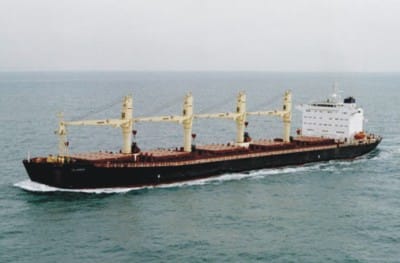Our heroes on a hijacked ship

MV Jahan Moni. Photo: EUNF Somalia
The extraordinary news of the hijacking of Bangladeshi ship MV Jahan Moni, belonging to Brave Royal Ship Management, has shocked us. The merchant ship was carrying nickel and was sailing from Indonesia to Greece after refueling at Singapore. According to reports, a group of pirates attacked the bulk carrier off the Indian port of Cochin on the afternoon of December 5, and it was last seen by satellites to be heading towards the Somali coast. Twenty-six Bangladeshi are on board, of which twenty-five are crew members and one lady, who is the spouse of the chief engineer.
Till December 10, neither the government of Bangladesh nor the ship management was able to contact the crew. It is still not clear who the hijackers are, what their intentions are, and whether they will announce their terms for the crew and the ship's release. According to reports, a task force has been constituted with government and international agencies to handle the matter.
News reports also say that help has been sought from the Indian Coast Guard, the Mumbai Maritime Rescue Co-ordination Centre, the Dubai based UK MTO and the Singapore based International Maritime Bureau. It is suggested that once the ship reaches the Somali coast then it may be possible to communicate with the crew and the pirates.
Piracy is not new in the Indian Ocean. It was in practice for centuries when traders used ships to transport valuable cargo between different destinations in the region. Historically, the Arabs for several centuries were the main seafaring traders and went as far as China, but kept a sharp eye out for pirates and deterred them from disrupting their commercial activity.
With the arrival of the Portuguese in the 15th century, the scenario changed dramatically in the Indian Ocean. They established trading posts along the coast and insisted that all other trading ships carry a "license," ostensibly issued by the Portuguese colonial authority. If any ship was unable to show the "papers," it was impounded and the cargo confiscated. According to many historians, they institutionalised piracy in the region.
Historical traces of Portuguese piracy can be seen in the coastal regions of Bangladesh, especially along the Chittagong-Cox's Bazaar and the Barisal coasts. The Portuguese pirates had hideouts in the jungles and the hills in these areas, and they would attack trading ships when they sailed up the major rivers with their rich cargo.
Their nefarious activity extended as far as the Hoogly river in West Bengal, India. With the coming of the Mughals, piracy continued as they did not have the wherewithal or the ships to contain it. But the British ended the age of marauding by superior force as they brought order in the Indian Ocean to protect their commercial interest.
Pirate attacks off the coast of Somalia started in early 1990's. These attacks were limited and were conducted close to shore. They were largely the work of fishermen displaced by the Somali civil war and foreign fishing in Somali waters.
But this has escalated to new heights. Somali pirates now take hostages and obtain ransom money after seizing vessels indiscriminately. They operate far outside Somali waters and disrupt trade and fishing as far away as the Seychelles. In our case, they have ventured as far away as the Indian coast.
Somali piracy has affected trade throughout the region. To combat this menace, there are several national and multinational counter piracy missions. These operations effectively began in 2008, when the US led Coalition of the Willing Combined Task Force 150 (CTF150), and now CTF 151, was given an anti-piracy mandate. It established a Maritime Security Patrol Area (MPSA) off the Somali coast. Running through the area is an internationally recognised and militarily patrolled transit corridor.
The European Union (EU) also is an active participant in the effort to protect shipping along this portion of the Indian Ocean. The EU naval force, called EUNAVFOR, takes part in joint naval operations in this area. Nato also has a counter piracy mission called the Operation Allied Protector, and now Operation Ocean Shield.
There are, of course, national counter piracy missions, which swoop in on the area to protect their national assets and interests. These missions are from China, India, Japan, Malaysia, Russia, Saudi Arabia, South Korea and Yemen. On average, there are 20 or more warships patrolling the MPSA area at any time. Pirates caught and disarmed can be sent to the country interdicting for prosecution and trial. Kenya is a country which often prosecutes these pirates if other countries are unable to do so for various reasons. There is also a Contact Group on piracy off the coast of Somalia for diplomatic and official co-ordination and information sharing.
It is well known that under International Law any warship can search a vessel on the high seas if it is suspected of piracy. All states have an equal claim to prosecute pirates. Prosecution does not require the permission of the pirate's state of nationality.
So what do we do once we know who hijacked MV Jahan Moni and why? Our government, after ascertaining the facts, must seek the assistance of relevant regional and international agencies to rescue the crew and the lady first. Their safety should be our first priority. We must study carefully what has been done in similar cases by other countries that had been victims of piracy. How did they rescue the crew of their hijacked vessels?
In any case the ordeal of the Bangladeshi victims is the ordeal of our nation. We must suitably recognise their valour in facing this unexpected challenge. In the eyes of many they are our heroes and a heroine.
The second priority is the ship itself and its cargo. The government, with the help of the ship's owner, should ensure its safe passage to its destination. The prosecution and trial of the pirates, if they can be apprehended alive, must be attended to. We should be seen to be a responsible nation and follow due process as laid down by international law.
We must also set up on a permanent basis a state-of-the-art monitoring of piracy and a prevention unit in the Ministry of Shipping or in the Ministry of Defense. Early warning about possible acts of piracy must be put in place so that ship captains are aware of impending dangers.
Bangladesh's exports and imports are burgeoning. Chartering of Bangladesh owned vessels is also on the increase as several companies have acquired ships at low cost during the recent worldwide recession. The nation's commercial interest cannot fall victim to a few marauders who can at will asphyxiate us. Our trade with the Middle East and Europe passes through this critical path to the Gulf of Aden and through the Suez Canal and beyond.
We cannot afford to be complacent. Our diplomats should be heard speaking loudly about crushing sea piracy in all international anti-piracy forums. Bangladesh's short and medium-term interest could be at stake if we do not take the right steps now.

 For all latest news, follow The Daily Star's Google News channel.
For all latest news, follow The Daily Star's Google News channel. 



Comments